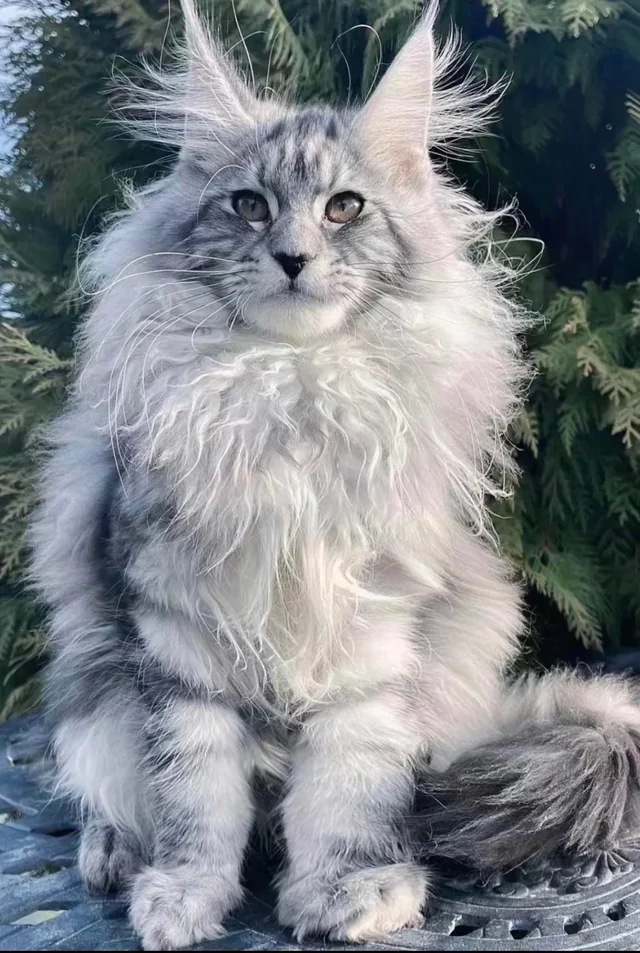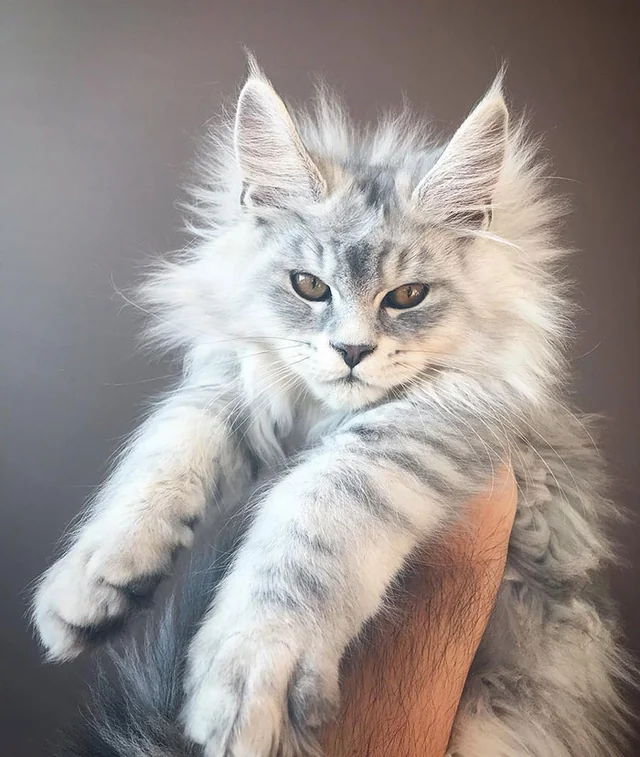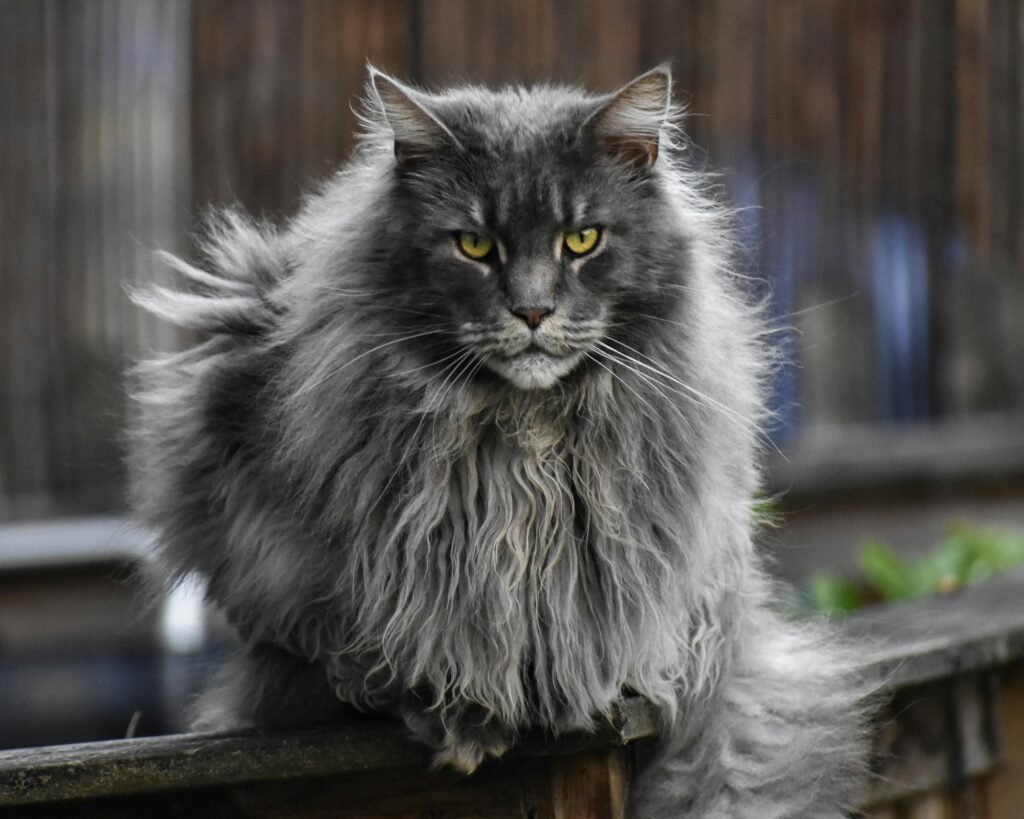Maine coon
Maine Coon cats are renowned for their impressive size, often considered one of the largest domestic cat breeds. Adult males typically weigh between 13 to 18 pounds, while females generally range from 8 to 12 pounds, though some exceptionally large individuals can surpass these averages. Their substantial frame is complemented by strong, muscular bodies, which contribute to their robust appearance. One of the most striking features of these felines is their tufted ears. These unique adaptations not only enhance their visual appeal but also serve a practical function, keeping their ears warm in colder climates.

The bushy tails of Maine Coons are another distinctive trait. Their tails are long, plush, and often compared to that of a raccoon, reflecting the breed’s name. This tail can be curled over the cat’s back for warmth during cold weather, a feature evolved from their origins in the cold, Northeastern United States. Furthermore, the Maine Coon’s fur is an essential aspect of its physical appeal. Their soft, water-repellent coat is semi-long and consists of two layers: a soft, insulating undercoat and a longer, protective outer coat. This dual-layering not only adds to their majestic appearance but also equips them to thrive in varying climates.
The Maine Coon breed exhibits a diverse range of color variations, including solid, tabby, and tortoiseshell patterns, which further enhance their visual charm. Some Maine Coons even possess unusual features, such as a prominent ruff of fur around their necks, reminiscent of a lion’s mane. These physical traits are beautifully suited to their native environments, allowing them to withstand harsh winters. In essence, the physical characteristics of Maine Coons contribute to both their beauty and adaptability, making them a beloved breed among cat enthusiasts worldwide.

Personality
Maine Coon cats are renowned not only for their size and physical attributes but also for their unique personality traits that endear them to many cat lovers. Generally regarded as one of the most sociable breeds, Maine Coons exhibit a remarkable ability to connect with humans and other animals alike. These felines are not merely solitary creatures; instead, they thrive in social environments, often seeking out companionship and interaction with their human family members.
One of the most distinctive characteristics of Maine Coons is their playful nature. They are known for retaining their kitten-like behavior well into adulthood, enjoying various types of play, including chasing after toys, playing fetch, and engaging in interactive games with their owners. This playful demeanor not only keeps them physically active but also helps to forge a strong bond with their humans. Such engaging behavior often leads to a lighthearted atmosphere within the household, making the presence of a Maine Coon ever-refreshing.
Maine Coons are also recognized for their intelligence, often displaying behaviors that demonstrate problem-solving abilities and curiosity. They are adept at learning commands and may even enjoy participating in training sessions. This intelligence combined with their affectionate nature facilitates a deeper interaction with their owners, as they often seek to understand and be part of their daily lives.
Though generally gentle and friendly, Maine Coons exhibit a range of quirks that further enhance their personality. Notably, their chatter—a unique blend of trills and chirps—adds an intriguing dimension to their communication style. Furthermore, they often display a quirky fascination with water, whether it’s playing in a sink or watching droplets fall. These traits make Maine Coons not just pets, but beloved companions that bring not only joy but also a distinctive character to any home.
Origins
The Maine Coon cat breed, renowned for its impressive stature and amiable disposition, boasts a rich history that captivates feline enthusiasts. Its origins trace back to the 19th century in the northeastern United States, primarily in Maine, where these cats became invaluable companions on farms. Several theories exist regarding the breed’s genesis, with one suggesting that they originated from the crossbreeding of domestic cats and longhaired breeds brought over by seafarers. This melding of genetic traits contributed to their distinctive physical features, including tufted ears and bushy tails, allowing them to thrive in harsh New England winters.

Moreover, the Maine Coon was naturally selected for its ability to hunt vermin on farms, playing a crucial role in protecting livestock and grain supplies. The hardworking nature of these cats quickly earned them a place in the hearts and homes of many families. Their robust build and playful temperament made them not only efficient hunters but also cherished companions. Historically, Maine Coons gained recognition in various cat shows during the late 1800s, solidifying their status as a distinct breed. Their popularity soared, making them one of the most beloved cat breeds of the time.
The breed faced challenges, including competition from other popular breeds and changes in agricultural practices that diminished their farm roles. Nonetheless, the resilience of the Maine Coon persisted, leading to efforts by enthusiasts to preserve and promote their lineage. Over the years, the breed has garnered accolades for its adaptability, intelligence, and affectionate nature, solidifying its reputation as one of the most celebrated domestic cat breeds worldwide. Today, Maine Coons are treasured not just for their captivating appearance but also for their endearing personalities, continuing to thrive as beloved companions in countless households.
Care of the Maine Coon cat
Caring for a Maine Coon requires a thoughtful approach that considers their unique grooming needs, dietary requirements, and overall health. This breed is known for its long, luxurious fur that requires regular grooming to prevent matting and tangles. It is advisable to brush your Maine Coon at least two to three times a week, using a sturdy metal comb or slicker brush, to maintain their coat’s health and sheen. In addition, regular grooming sessions allow you to check for signs of skin irritations or parasites, which can be beneficial for their overall well-being.
Feeding your Maine Coon with high-quality, nutrient-dense food is crucial, as these large cats have specific dietary needs to support their growth and energy levels. A diet rich in protein is particularly important. Consult with a veterinarian to determine the best feeding schedule and portion sizes based on your cat’s age, weight, and activity level. Avoid leaving food out all day as this can lead to overeating and obesity, which is a common health concern for this breed.
Regular veterinary check-ups are essential to monitor your Maine Coon’s health and prevent potential issues. These visits can help in detecting early signs of common health problems, such as hypertrophic cardiomyopathy or hip dysplasia, that this breed may be prone to. Moreover, maintaining an active lifestyle is crucial for a Maine Coon’s physical and mental stimulation. Engaging your cat in playtime or providing interactive toys will keep them entertained and healthy.
Maine Coons thrive in environments that allow for both indoor comfort and outdoor exploration. If outdoor access is granted, ensure a safe space where they can explore without the risk of injury or escape. Creating a conducive environment tailored to their needs will significantly enhance their quality of life.
Health
Maine Coons are generally healthy but prone to conditions like hypertrophic cardiomyopathy (HCM), hip dysplasia, and spinal muscular atrophy. Regular vet check-ups, a balanced diet, and proper grooming help maintain their well-being. Ensure genetic screening and preventive care to keep your Maine Coon happy and healthy.
Nutrition
The Maine Coon, one of the largest domestic cat breeds, requires a balanced diet rich in high-quality protein, healthy fats, and essential nutrients to support its muscular build and thick fur. Opt for premium cat food with real meat as the main ingredient, supplemented with omega fatty acids for coat health and taurine for heart function. Avoid fillers and artificial additives to prevent obesity and digestive issues. Proper hydration and portion control are key to maintaining an ideal weight. Discover the best nutrition plan for your Maine Coon to ensure a long, healthy life!
Cleanliness
Maine Coon cats are naturally clean and require moderate grooming to maintain their luxurious, water-resistant fur. Their thick coat repels dirt, but regular brushing (2-3 times a week) prevents matting and reduces shedding. Unlike some long-haired breeds, Maine Coons are less prone to excessive tangles, making them relatively low-maintenance. Keeping their litter box clean and providing routine ear and dental care ensures optimal hygiene. With proper upkeep, Maine Coons stay fresh, healthy, and odor-free.
Best cat breeds for kids
The Maine Coon is one of the best cat breeds for kids, known for its gentle nature, playful personality, and affectionate demeanor. This large, fluffy feline is highly sociable, intelligent, and patient, making it a perfect family pet. Maine Coons enjoy interactive play and adapt well to children, offering companionship and fun. Their sturdy build and friendly temperament make them ideal for households with young ones. If you’re looking for a kid-friendly cat breed, the Maine Coon is a top choice!
People who have seen this breed have also visited…
In this section you can find completely detailed information about the breed of your cat.
